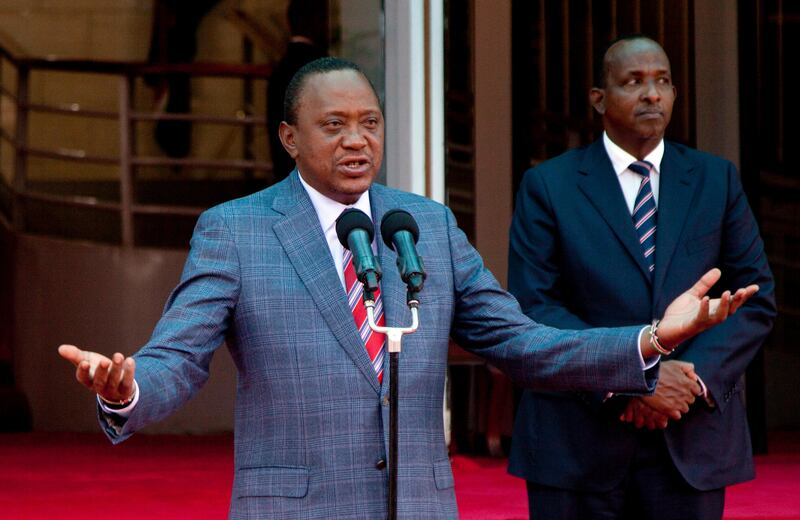Kenya's president Uhuru Kenyatta on Monday appealed to the opposition to hold legal demonstrations, not street protests, and allow Kenyans to get back to normal life after last week's disputed vote.
"To our friends who have yet to accept the outcome, we continue to appeal to them, and we have extended our arm and a hand of peace, and a hand of friendship, and for them to use whatever legal mechanisms that have been created via our wonderful constitution to express their dissatisfaction," Mr Kenyatta said.
Opposition leader Raila Odinga's rejection of the results of Tuesday's election - in which Mr Kenyatta won 54 per cent of the vote - has led to sometimes violent clashes between his supporters and police that have killed at least 16 people since Friday.
Mr Odinga has said he will announce "the next course of action" on Tuesday, leaving Kenya on tenterhooks.
Mr Kenyatta said Mr Odinga should follow legal avenues to protest the election, and repeated a call for peace.
"At the end of the day we are all Kenyans, we don't need to fight one another, we don't need to destroy each other's property, we don't need to take life," he said.
"There is not a single Kenyan anywhere who wants to continue to see violence, looting and demonstrations that end up destroying properties," he said, striking the same conciliatory tone he used when accepting victory on Friday.
On Monday, residents returned to work in the capital despite a call by opposition leader Mr Odinga to stay at home to protest the disputed election.
Some street stalls were closed but others opened in the Nairobi slum of Mathare, an opposition stronghold where police battled rioters following the August 8 election that Mr Odinga said was fraudulent. The Kenyan election commission says its voting and counting process was not rigged and international observers have praised Kenya's handling of the election.
Minibus taxi drivers shouted for business from potential passengers in a busy intersection inside Mathare as residents carried vegetables, chickens and went about their business. There was a small protest in Nairobi's Kibera slum, another scene of recent clashes.
Life is returning to normal and residents of the capital are "safe and secure", said Japheth Koome, the Nairobi police chief.
Even so, there was tension overnight as young men with machetes moved around some areas.
Mr Odinga has said he will announce his "next step" on Tuesday as the government urges people to resume their routines, nearly a week after the election in the East African commercial hub of 45 million people.
While he has remained defiant and is sticking to his position that the election was rigged, some sectors of society are urging him to acknowledge defeat so that the country can stabilise.
"I must go out to hustle for myself so I can pay rent, so I can feed myself," said Isack Avonga, a Nairobi resident who disregarded Mr Odinga's call for a boycott.
Police have fatally shot 24 people in election violence since the vote, according to the state-funded Kenya National Commission on Human Rights, which monitors government institutions.
Police have denied they killed that many people, saying they shot some criminals who attacked them and that none of the protests were peaceful.





